Home Tags Posts tagged with "Troy Davis"
Troy Davis
Rhonda Cook from the Atlanta Journal-Constitution, JoAnn Merrigan of WSAV News in Savannah and Greg Bluestein of the Associated Press, who all have covered more than 20 executions between them in the past, were three of five reporters allowed to watch the controversial death of Troy Davis at Georgia State Prison last night.
Troy Davis, who murdered an off-duty police officer, was executed by lethal injection after a tense four-hour delay. Here is what the reporters witnessed:
Rhonda Cook, Atlanta Journal-Constitution:
Just after 10:30 Wednesday night two words stopped the conversation among reporters instantly.
“Y’all ready?” a correctional officer asked.
We were moments away from witnessing an execution. Media witnesses are as much a part of the execution process as the officers who escort the inmate to the death chamber or the officers who strap the condemned to a gurney.

Troy Davis was put to death in Jackson, Georgia, last night
Wednesday, we were there as unbiased witnesses, sitting on the back row. Our seats were behind those there on behalf of the condemned and those who prosecuted or arrested Troy Davis for the 1989 murder of Savannah police officer Mark Allen MacPhail. The dead officer’s son and namesake, Mark MacPhail Jr., and his brother, William MacPhail, were there for the family.
We spoke little from that moment on, the five reporters selected to witness the execution.
As the officer called our names, we lined up and left the room where we had waited for so long, oblivious to the last-ditch effort to spare Davis and the police presence and protests beyond the prison’s walls.
In the death chamber, we took our seats on the last of three pews.
Warden Carl Humphrey began the process by reading the execution order signed by Chatham County Judge Penny Haas Freesmann. “The court having sentenced defendant Troy Anthony Davis on the third day of September, 1991, to be executed….”
Then he asked Davis if he has any final words.
Yes, the condemned man said and he raised his head so he could look at Mark MacPhail Jr., who was an infant when his father was murdered, and William MacPhail, the dead officer’s brother.
“I’m sorry for your loss,” Davis said.
Mark MacPhail, who was leaning forward, and his uncle did not move. They stared at the man who killed their loved one.
“I did not personally kill your son, father and brother,” Davis said. “I am innocent.”
He asked his family and friends to continue to search for the truth.
And to the prison officials he said: “May God have mercy on your souls. May God bless your souls.”
He then lowered his head. He turned down an offer for a prayer.
Within minutes, Troy Anthony Davis slipped out of consciousness and in 14 minutes he was dead.
A three-drug cocktail ended his life. First pentobarbital put Davis in a drug-induced coma. The paralytic pancuronium bromide was second. Potassium chloride stopped Davis’ heart.
“The court ordered execution of Troy Anthony Davis was carried out in accordance with the laws of the state of Georgia,” the warden announced.
Curtains in the death chamber were closed and we were quickly ushered out.
Waiting for us at the media staging area was a line of correctional officers, deputy sheriffs and state troopers blocking protesters from crossing Georgia Highway 36 onto prison property and hoards of local, national and international reporters waiting for the reporters who witnessed the execution to describe what happened.
He went peacefully, one of the reporters said
Greg Bluestein, Associated Press:
It didn’t take long to notice Troy Davis’ execution was different from the others I’ve covered. As I drove up to the prison, I could see the crowds of protesters and a group of at least 50 reporters.
I’ve covered about 10 executions in Georgia. None of them are easy. This was by far the most unusual.
There were four reporters besides me there to witness the execution.
We ended up waiting for more than four hours in a sombre prison break room. We made small talk and speculated about whether the U.S. Supreme Court could intervene. At times, it was silent.
Around 10:30 p.m., a guard walked in and said: “You ready?”

Execution chamber at Georgia State Prison in Jackson, where Troy Davis was sedated, strapped to a gurney and given a lethal injection
We were led into a white van and, after passing through several security checkpoints, we were delivered to the squat white building on the edge of the prison that serves as the death chamber. We watched the slain officer’s son, Mark MacPhail Jr., enter the building. Behind him, Jason Ewart, the condemned man’s attorney, walked in. A county coroner’s van rolled up.
By the time we were inside, officials had already strapped Davis to the gurney. There was a glass window with a curtain separating Davis from the witnesses, who sat in three rows of seats. There were about 20 of us.
Davis searched for Ewart, who nodded slightly when they locked eyes. MacPhail Jr., sitting in the front row, focused on Davis.
When it was time to deliver his last words, Davis’ seized the moment, speaking quickly and confidently.
He told the MacPhail family he was not responsible for the death. “I am innocent. The incident that happened that night is not my fault,” he said.
Davis urged his supporters to “continue to fight the fight.” And just before the lethal drugs coursed through his veins, he offered a message to his executioners: “God have mercy on your souls.”
Davis blinked his eyes rapidly. He squeezed them tight. The curtain closed.
JoAnn Merrigan, WSAV News:
Prison officials arrived to take me to the prison at 5:45pm. I arrived at the State Prison in Jackson, Georgia at 5:50pm.
At 6:02, I was taken into a waiting room where I stayed for around four hours with no knowledge of what was going on. Every so often, someone would come in and say the execution had been delayed.
Around 9:00pm, I went to the bathroom and heard some people talking.
Around 10:20pm, an official came and brought me out into a hallway where I was told to stop. Three men, including the warden, were walking around. Attorney General Sam Olens was also there. He walked quickly one way, then the other. Then the prison official said it was time to go around 10:25pm.
I got into a car with three attorneys from the Attorney General’s office, and rode along with a caravan of cars to a building. The drive took around two minutes, and we arrived at 10:27pm.
I walked into the room and sat in the front row, about a dozen people were also in the room. The room had a window showing the execution chamber.
Two men came in, the warden and another man.
Then five guards escorted in Troy Davis and laid him down on the gurney. He appeared calm at this time.
The five guards began methodically strapping in Davis. They started with each foot first, then each knee, then each arm.
A fifth strap was laid across Davis’s shoulders.
At this point, Davis picked up his head to look around the room. I was about four to five feet from the window.
Two women then came in with heart monitoring equipment and strapped it to his chest. No one in the room spoke.
The two women then put a syringe into each arm, the left first then the right. Long tubes connected the needles through two holes in the cement wall. I understand that tubes were connected to two intravenous drips containing the chemicals.
At this point, Davis raised his head for a second time to look at the room beyond the window.
Two guards then placed surgical tape around Davis’s fingertips, strapping them to the gurney.
The bed was then raised to an upright angle, facing the crowd. I could see him clearly, being only four to five feet from the window.
I then moved to the back of the room. At this point, the family of Officer Mark MacPhail, including Billy MacPhail the brother, and Mark MacPhail Jr, the son, entered the room and sat in the front row.
There were also other witnesses, totalling eight people, who also sat in the front row.
Defence attorneys Jason Ewart and Thomas Ruffin came in and sat in the second row with others.
At this point, other media witnesses were brought in and they sat in the back row with me. A total of around 30 people were in the room.
About 15 minutes had passed since I first entered the room.
A microphone was turned on and the warden said, ‘We are here for the execution of Troy Anthony Davis with all witnesses present.’ He also asked that the witnesses remain silent. He then asked Davis if he had anything he wanted to say. Davis replied: “Yes.”
Davis said: “I want to address the members of the MacPhail family. Despite the situation we are all in, you think I’ve killed your father, your brother, your husband, I’m not the person, I’m innocent, what happened was not my fault, I did not have a gun that night, I did not shoot your family member. I’m so sorry for your loss, I really am. I hope you will finally see the truth and others will, too. To my family and supporters, thank you for your prayers and continue to pray. For those about to take my life, I forgive you. God bless you all.”
The warden then read the death warrant. Davis looked out at the crowd, and though he seemed calm, it did appear he was somewhat scared.
The room was very quiet when the injections began.
First, Davis received an injection of pentobarbital, a sedative. Second, he received an injection of pancuronium bromide, a muscle relaxer. Lastly, he was injected with potassium chloride to induce cardiac arrest.
After a short amount of time, Davis yawned then closed his eyes.
The room was quiet and all I heard was my pencil moving over paper.
A woman then came in and checked his eyes, then there was a ‘beep.’ Mark MacPhail Jr was leaning towards the window.
The microphone was turned on again, and two doctors entered the room wearing long white coats.
One doctor checked his pulse and placed a stethoscope on his chest. Then the second doctor performed the same procedure. At the end, the second doctor looked at the first and nodded his head.
The warden then said: “At 11:08 September 21st, the court ordered execution of Troy Davis was carried out in accordance with the laws of Georgia.”
I was escorted out of the room and saw a black Butts County coroner’s van of outside the building.
About 30 to 35 minutes had passed by the time I entered the room, until the time Davis was pronounced.
Just before his execution Troy Davis told the family of murdered policeman Mark MacPhail, “I’m innocent. I didn’t kill your son.”
Strapped to a gurney, awaiting lethal injection, Troy Davis lifted his head and looked at Mark MacPhail’s family, to repeat his claim that he was not responsible for the police officer’s 1989 murder.
Troy Davis last words were: “I’d like to address the MacPhail family. Let you know, despite the situation you are in, I’m not the one who personally killed your son, your father, your brother. I am innocent.
“The incident that happened that night is not my fault. I did not have a gun. All I can ask … is that you look deeper into this case so that you really can finally see the truth.”
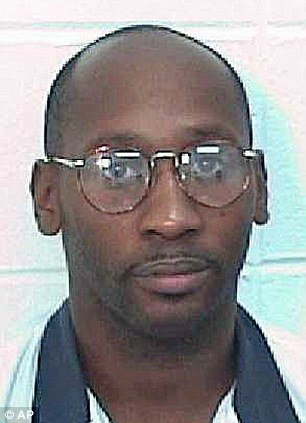
Troy Davis, the convicted murderer of police officer Mark MacPhail was executed by lethal injection on Wednesday
Troy Davis then asked his family and friends “to continue to fight this fight.”
At the end he said: “For those about to take my life, God have mercy on your souls. And may God bless your souls.”
The execution went ahead despite a dramatic intervention minutes before Troy Davis was due to be put to death.
Defense lawyers had made a last ditch appeal to the US Supreme Court,but after four hours deliberation, the nine justices unanimously decided to uphold the execution.
Few minutes later Troy Davis was strapped to the chair and he was declared dead at 11:08 p.m.
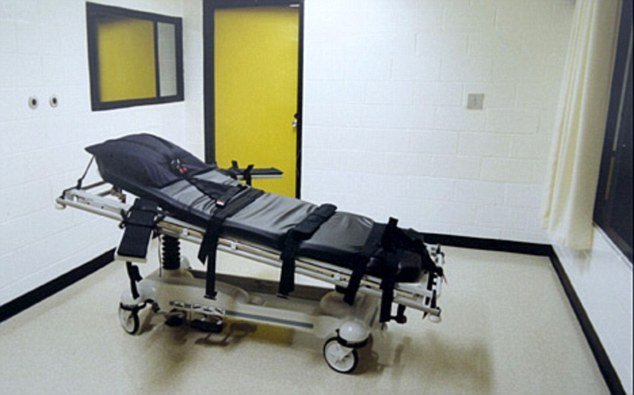
The chamber at Jackson prison, Georgia, where Troy Davis was executed
Troy Davis’ lawyer Thomas Ruffin denounced the execution as “a legalized lynching”.
Troy Davis’ case was riddled with doubt, the lawyer maintained.
Thomas Ruffin described the process of execution as “sickening”.
“I saw the tube inserted into his arm, and then fluid, then jerking.
“It’s sickening. It’s worse than any film adaptation. It’s more macabre and horrible than anything on film and television.”
The last minute appeal by defense lawyers challenged ballistics linking the death row inmate to the 1989 murder of off-duty policeman Mark MacPhail and eyewitness testimony identifying Troy Davis as the killer.
After more than four hours the appeal was denied by all nine Supreme Court judges, five of them being needed to stay the execution.
The statement issued by the Supreme Court read:
“The application for stay of execution of sentence of death presented to Justice (Clarence) Thomas and by him referred to the Court is denied”
Hundreds of protesters and Troy Davis supporters on the scene at Jackson prison had initially celebrated at word that the death by lethal injection had been temporarily halted.
Until the moment when it seemed almost certain that Troy Davis would be executed.
Georgia’ Supreme Court had earlier on Wednesday rejected a last-chance appeal by defense lawyers.
A Butts County superior court judge had also declined to stop the execution.
Troy Davis’ lawyers went to the US Supreme Court at around 6:00 p.m. Wednesday. From 7:00 p.m. state of Georgia was within its rights to execute Troy Davis but instead chose to wait for the Supreme Court’s decision.
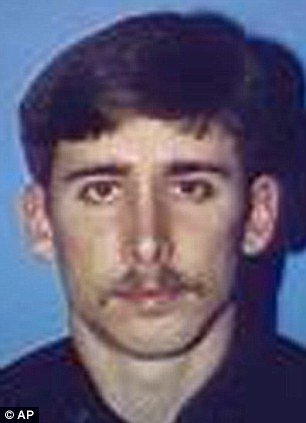
Police officer Mark MacPhail was shot dead in Savannah, Georgia, in August 1989
Anneliese MacPhail, the mother of murdered police officer Mark MacPhail, told CNN she was hoped to find peace now.
“I just feel relieved that it’s over.”
“It took a long time to get here.”
Earlier speaking after the Supreme Court decision Anneliese MacPhail said:
“I’d like to have some peace now that it is over… I’d like it to come to an end now.
“We have been through hell. He [Davis] did this. Nobody made him do it. It was his choice.
“I have lost my son and the father of my grandchildren. He has made his own bed and he’s got to sleep in it.”
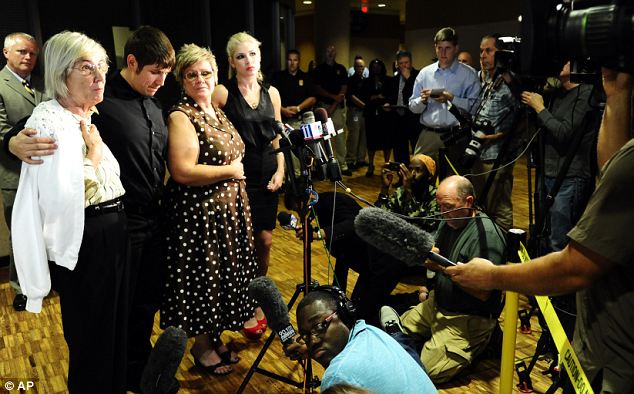
Mark MacPhail's family spoke of their relief Wednesday after Supreme Court upholds the execution
The new four hours delay had caused the MacPhail family extra anguish she said.
“I’m absolutely devastated because I want it over with. … They’ve been through the courts four times there in Georgia. They’ve been to the Supreme Court three times.
“This delay, again, is very upsetting and I think very unfair to us.”
“I’d like to close this book. We feel [Troy Davis is] guilty. The evidence and everything that we have seen – that I have seen, because I’ve been to all the trials – he is guilty, and I believe in that. And so does the rest of my family.”
Outside the prison in Jackson, a vigil was held on Wednesday night. Amnesty International also targeted U.S. embassies across the world.
Last night event was heavily policed, with more than 100 Georgia state troopers in riot gear gathering at the scene, as prison officials, family members and protestors reacted to the Supreme Court’s decision.
They had resorted to increasingly desperate measures such as urging prison workers to strike and posting a judge’s phone number online.
Before his death Troy Davis was sad to be “upbeat and prayerful” and turned down the opportunity to have a last meal of his choice – as protesters gathered as far afield as Paris and London.
Defense lawyer Stephen Marsh had hoped the lie detector test would convince the state pardons board to reconsider a decision against clemency, but the request was rejected yesterday.
Wednesday night was the fourth time and final time that Troy Davis’ execution has been scheduled by Georgia officials.
Troy Davis always claimed he was innocent of killing Mark MacPhail, an off-duty police officer working as a security guard in Savannah, Georgia in 1989. But state and federal courts repeatedly upheld his conviction.
Prosecutors and Mark MacPhail’s relatives said they have no doubt the right man is being punished.
Just one day before execution, Georgia’s pardons board rejected a last-ditch clemency plea despite high-profile support from figures including Pope Benedict XVI and a former FBI director for the claim that Troy Davis was wrongly convicted.
Troy Davis’ last days:
September 17: Georgia Board of Pardons and Paroles receives 600,000-signature petition asking for clemency.
September 19: The board holds a clemency hearing.
September 20: Board denies clemency for Davis, reportedly by a majority of three to two.
Yesterday a.m.: Defense attorneys’ last ditch request for a polyghraph test is denied by the board.
Yesterday 5:00 p.m.: Georgia Supreme Court judge denies a final appeal
6:00 p.m.: Troy Davis’ lawyers “hit send” on an application to US Supreme Court
6:50 p.m.: Dramatic last minute intervention halts proceedings.
7:00 p.m.: Georgia is within its rights to execute Troy Davis but awaits Supreme Court decision
10:18 p.m.: Lawyers say the Supreme Court have denied Troy Davis’ appeal
10:53 p.m.: Execution begins
11:08 p.m.: Troy Davis is declared dead
Troy Davis’s request for a polygraph test to try to prove his innocence ahead of tonight’s planned execution has been denied by Georgia Department of Corrections.
Defense lawyer Stephen Marsh said he had hoped the lie detector test would convince the state pardons board to reconsider a decision against clemency, which was rejected yesterday.
Troy Davis’ execution is scheduled for 7pm tonight. It is the fourth time in four years that Troy Davis‘ execution has been scheduled by Georgia officials.
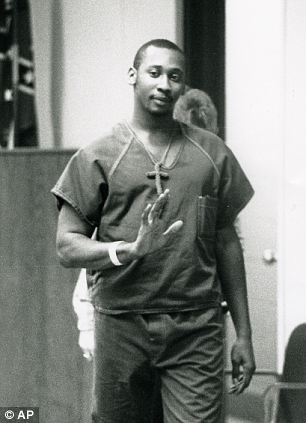
Troy Davis's request for a polygraph test to try to prove his innocence ahead of tonight's planned execution has been denied by Georgia Department of Corrections
Troy Davis, 42, has long claimed he is innocent of killing Mark MacPhail, an off-duty police officer working as a security guard in Savannah, Georgia in 1989. But state and federal courts have repeatedly upheld his conviction.
Prosecutors and Mark MacPhail’s relatives say they have no doubt the right man is being punished.
Yesterday, Georgia’s pardons board rejected the clemency plea despite high-profile support from figures including Pope Benedict XVI and a former FBI director for the claim that he was wrongly convicted.
The board did not elaborate on the decision in its written official response to the clemency application.
The decision appeared to leave Troy Davis with little chance of avoiding the execution date.
Troy Davis will be executed by injection at 7pm tonight for the August 1989 murder of Mark MacPhail, a 27-year-old off-duty police officer who was working as a security guard in Savannah when he was shot dead rushing to help a homeless man who had been attacked.
Troy Davis didn’t want a special last meal, but he planned to spend his final hours meeting with friends, family and supporters. According to an advocate who met with him late Tuesday, Davis was upbeat, prayerful and expected last-minute wrangling by attorneys.
“He doesn’t want to spend three hours away from his family on what could be the last day of his life if it won’t make any difference,” advocate said.
Troy Davis’ lawyers have long argued he was a victim of mistaken identity. But prosecutors say they have no doubt that they charged the right person with the crime.
Spencer Lawton, the district attorney who secured Troy Davis’ conviction in 1991, said he was embarrassed for the judicial system that the execution has taken so long.
“What we have had is a manufactured appearance of doubt which has taken on the quality of legitimate doubt itself. And all of it is exquisitely unfair,” said Spencer Lawton, who retired as Chatham County’s head prosecutor in 2008.
“The good news is we live in a civilized society where questions like this are decided based on fact in open and transparent courts of law, and not on street corners.”
Troy Davis case has captured worldwide attention because of the doubt his supporters have raised over whether he killed Mark MacPhail, who was shot to death after coming to the aid of Larry Young, a homeless man who was pistol-whipped in a Burger King parking lot.
Prosecutors say Troy Davis was with another man who was demanding that Larry Young give him a beer when Davis pulled out a handgun and bashed Young with it. When Mark MacPhail arrived to help, they say Troy Davis had a smirk on his face as he shot the officer to death.
Witnesses placed Troy Davis at the crime scene and identified him as the shooter. Shell casings were linked to an earlier shooting that Troy Davis was convicted of. There was no other physical evidence. No blood or DNA tied Troy Davis to the crime and the weapon was never found.
Troy Davis’ attorneys say seven of nine key witnesses who testified at his trial have disputed all or parts of their testimony.
The state initially planned to execute him in July 2007 but the pardons board granted him a stay less than 24 hours before he was to die. The U.S. Supreme Court stepped in a year later and halted the lethal injection two hours before he was to be executed. And a federal appeals court halted another planned execution a few months later.
The U.S. Supreme Court granted Troy Davis a hearing to prove his innocence, the first time it had done so for a death row inmate in at least 50 years.
At the June 2010 hearing, two witnesses testified that they falsely incriminated Troy Davis at his trial when they said Davis confessed to the killing. Two others told the judge the man with Troy Davis that night later said he shot Mark MacPhail.
Prosecutors, though, argued that Troy Davis’ lawyers were simply rehashing old testimony that had already been rejected by a jury. And they said no trial court could ever consider the hearsay from the other witnesses who blamed the other man for the crime.
U.S. District Judge William T. Moore Jr. sided with them. He said the evidence presented at the hearing wasn’t nearly enough to prove Troy Davis is innocent and validate his request for a new trial. He said while Davis’ “new evidence casts some additional, minimal doubt on his conviction, it is largely smoke and mirrors.”
Troy Davis was convicted of the August 19, 1989, murder of Georgia police officer Mark MacPhail, who was working as a security guard at a Burger King when he intervened in an argument between several men in a nearby parking lot.
Mark MacPhail was shot in the heart and face without having drawn his gun.
One of the men, Sylvester Coles, went to police and implicated Troy Davis in the killing, and he was arrested four days later.
During Troy Davis’ 1991 trial, many witnesses testified they had seen him shooting MacPhail. Two other witnesses testified that Troy Davis had confessed the murder to them.
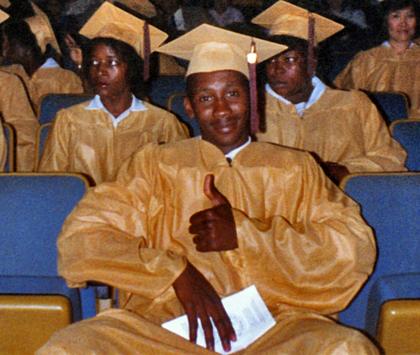
Troy Davis was convicted of the August 19, 1989, murder of Georgia police officer Mark MacPhail
The murder weapon was never found, and no physical evidence linked Troy Davis to the crime.
Throughout his trial and subsequent appeals, Troy Davis has maintained his innocence but was sentenced to death in August 1991.
Seven of nine witnesses to the murder changed or recanted their testimony in recent years. Several stated they had felt pressure by police to implicate Troy Davis.
New witnesses implicated Sylvester Coles in the crime.
Many appeals in state and federal courts followed, Troy Davis and his lawyers arguing that the racial composition of the jury and poor advocacy from his lawyers had affected his right to a fair trial.
In an August 2010 decision, the conviction was upheld, with the U.S. District Court for the Southern District of Georgia declaring that the new evidence cast only ‘minimal doubt on his conviction’. Subsequent appeals, including to the Supreme Court, were rejected.
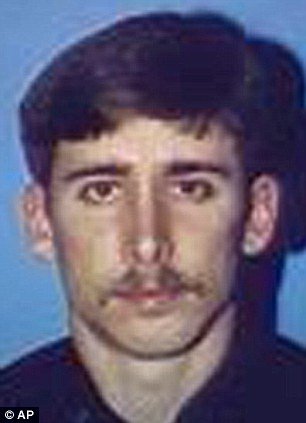
Police officer Mark MacPhail was shot dead in Savannah, Georgia, in August 1989
In July 2007, September 2008, and October 2008, Troy Davis execution dates were scheduled but stayed shortly before the events took place.
Troy Davis is set to be executed by lethal injection on September 21, 2011, at 7:00 pm, as he has lost a bid for clemency launched by his defense lawyers.
In the last day of his life, he declined to order a special last meal. Troy Davis will be served what’s on the menu at the Georgia state prison in Jackson before his execution – grilled cheeseburger, oven-browned potatoes, baked beans, coleslaw, cookies and a grape beverage.
Troy Davis, the convicted murderer of a police officer, who is set to be executed by lethal injection on Wednesday, has lost a bid for clemency launched by his defense lawyers.
Georgia’s board of pardons rejected the last-minute plea even after it attracted high-profile support, and Troy Davis execution will go ahead as planned.
It was the last hope for Troy Davis, 42, who was convicted of killing police officer Mark MacPhail, in Savannah, Georgia, in 1989.
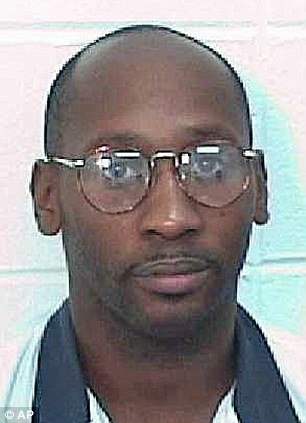
Troy Davis, the convicted murderer of a police officer is set to be executed by lethal injection on Wednesday
Anti-death penalty activists, who claim Troy Davis was wrongly convicted, chanted and held banners through Atlanta last week.
It is the fourth time in four years Troy Davis execution has been scheduled by Georgia officials.
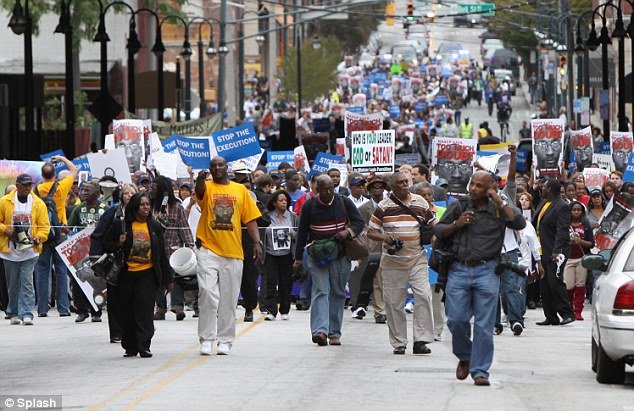
Anti-death penalty activists, who claim Troy Davis was wrongly convicted, chanted and held banners through Atlanta last week
According to Steve Hayes, spokesman for the Board of Pardons and Paroles, the panel decided to rejected Troy Davis’ request for clemency after hearing hours of testimony from his supporters and prosecutors.
The board decision appeared to leave him with little chance of avoiding the execution date. Defence attorney Jason Ewart has said that the pardons board was likely Troy Davis’ last option.
The defense lawyers have long argued Troy Davis was a victim of mistaken identity, but prosecutors say they have no doubt that they charged the right person with the crime.
Officer Mark MacPhail’s relatives said they were relieved by the decision.
“That’s what we wanted, and that’s what we got,” said Anneliese MacPhail, the victim’s mother.
“We wanted to get it over with, and for him to get his punishment.”
“Justice was finally served for my father,” said Mark MacPhail Jr, victim’ son, who was an infant when his father was gunned down.
“The truth was finally heard.”
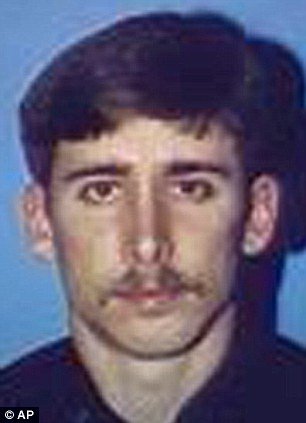
Police officer Mark MacPhail was shot dead in Savannah, Georgia, in August 1989
Troy Davis’ sister, Kim Davis declined immediate comment on the decision.
Amnesty International USA director Larry Cox said in a statement that the decision was “unconscionable”.
“Should Troy Davis be executed, Georgia may well have executed an innocent man and in so doing discredited the justice system,” Larry Cox said.
The case has captured international attention because of concerns about the quality of evidence involved in Troy Davis’s conviction.
Troy Davis’s supporters said there is no physical evidence linking him to the crime and that key witnesses in his trial have since recanted their testimony.
Martin Luther King III, son of the late civil rights leader Martin Luther King Jr, joined the last week march. Reverend Al Sharpton, a civil rights activist and television show host, also attended.
In August 2009, in a rare move, the U.S. Supreme Court ordered a new hearing for Troy Davis to assess what he said was new evidence showing his innocence.
The justices transferred the case to a U.S. District Court in Georgia for a hearing and determination of Troy Davis claims that new witnesses will clearly establish his innocence.
In 2010, the judge, William T. Moore Jr, rejected Troy Davis’ claims of innocence. But last week, supporters of Troy Davis delivered petitions with more than 600,000 names to the parole board.
In a column last week in the Atlanta Journal Constitution, former FBI Director William Sessions called for Troy Davis’s sentence to be commuted to life in prison, saying the case was “permeated in doubt”.
However, in an opposing column written in late 2008 and republished on last Thursday, Spencer Lawton, the district attorney who prosecuted Davis, said the convicted man had a fair trial.
[youtube Ntfu5bOVSYk]












